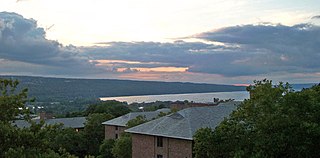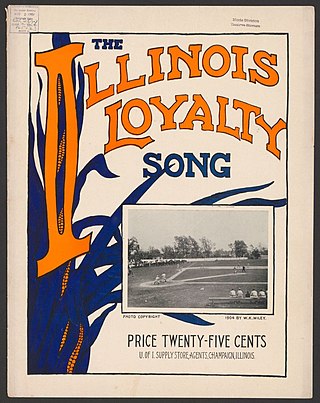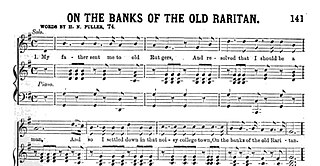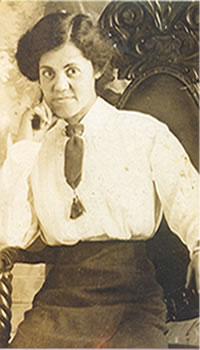"Hail, Pennsylvania!" is a song written by Edgar M. Dilley as a submission to a University of Pennsylvania alumni committee-sponsored contest to write a song to the tune of "God Save the Tsar!", the national anthem of Imperial Russia, by Alexei Fyodorovich Lvov. Dilley was awarded $25 for creating it. It served as the regional anthem of Pennsylvania until 1990 and now serves as the municipal anthem of Scranton, Pennsylvania.

"Hail! Minnesota" is the regional anthem of the U.S. state of Minnesota. A variation is used as a school song of the University of Minnesota. It originated at the university in the early 20th century when some students decided to honor their graduating class with a new song. In 1945, the Minnesota State Legislature approved the tune as the state song.

"Far Above Cayuga's Waters" is Cornell University's alma mater. The lyrics were written circa 1870 by roommates Archibald Croswell Weeks, and Wilmot Moses Smith, and set to the tune of "Annie Lisle", a popular 1857 ballad by H. S. Thompson about a heroine dying of tuberculosis.

"Illinois Loyalty", also known as "We're Loyal to You, Illinois" or just "Loyalty", is a song associated with the University of Illinois Urbana-Champaign. It is the school's alma mater. It is also used as the school's fight song.
"Fair Harvard" is the alma mater of Harvard University. Written by the Reverend Samuel Gilman of the class of 1811 for the university's 200th anniversary in 1836, it bids the school an affectionate farewell. Of its four verses, the first and fourth are traditionally sung and the second and third omitted.

"Carmen Ohio" is the oldest school song still used by Ohio State University. The song was composed by freshman athlete and Men's Glee Club member Fred Cornell in 1902 or 1903. According to some accounts, he composed it on the train ride home from Ann Arbor, Michigan after Ohio State suffered an 86-0 loss to the Michigan Wolverines. The song is set to the tune of "Spanish Hymn", or "Spanish Chant". The Men's Glee Club first performed it in 1903; however, it did not gain popularity until after its publication in The Lantern on October 10, 1906. At the following Ohio State–Michigan football game on October 20, 1906, "Carmen Ohio" was published in the program. In 1915, Cornell recalled that he wrote the song in 1903 at the request of the Men's Glee Club, and other family members later stated that the train story might be an exaggeration or outright fabrication. Currently, after every home football game in Ohio Stadium, win or lose, the football team and the crowd sing the first verse of Carmen Ohio, accompanied by The Ohio State University Marching Band. It is also sung by new graduates at the end of the university's commencement ceremonies, after diplomas are distributed.

The "UNH Alma Mater" is the official alma mater of the University of New Hampshire in Durham, New Hampshire. The lyrics to the song were written by Herbert Fisher Moore, an 1898 graduate of the school, and are sung to the tune "Lancashire" by Henry Smart.

"On the Banks of the Old Raritan" is a song, or alma mater, associated with Rutgers, The State University of New Jersey, in the United States. The original lyrics were written in 1873 by Howard Newton Fuller, an 1874 graduate of Rutgers College. Fuller quickly prepared the song as a school hymn for the college's Glee Club, an all-male choral ensemble, before a performance in Metuchen, New Jersey. Fuller chose to set the lyrics to the tune of melody, "On the Banks of the Old Dundee", a popular Scottish melody regarded as a drinking song, and titled the song for the Raritan River.
"Song to Old Union" is the alma mater of Union College in Schenectady, New York. It was written by Fitz Hugh Ludlow for Union's 1856 commencement ceremonies. It is sung each year at graduation, although it is the rare student or alumnus who knows more than the first verse and chorus.
"Victory" is an old fight song of the Pennsylvania State University. It is most often sung by the Penn State Glee Club and performed by the Penn State Blue Band.
The Duke University Alma Mater, also known as Dear Old Duke, is the official alma mater of Duke University in Durham, North Carolina.
"We Hail Thee Carolina" is the alma mater of the University of South Carolina. It was adopted by the university in 1912 and is sung by alumni and students at Gamecock athletic events. The alma mater is also used to conclude each football game, home or away.
"Bright College Years" is one of the traditional songs of Yale University, and the university's unofficial but undisputed alma mater. It was written in 1881 by Henry Durand and set to the tune of "Die Wacht am Rhein".

"Hail to Pitt" is the most traditional fight song of the University of Pittsburgh, which is commonly referred to as Pitt. The saying "Hail to Pitt!" is also the most traditional and commonly used slogan of the University of Pittsburgh and its athletics teams. The slogan is frequently used in promotional material, printed on merchandise and souvenirs. It was also the title of a 1982 history of Pitt athletics by author Jim O'Brien. The slogan is often used among alumni as a statement of affiliation, including as a closing signature in conversation or correspondence between alumni, and is sometime abbreviated as "HTP" or "H2P", the latter of which is a registered trademark of the university and is frequently used on official university signage and merchandise.

"Hark the Sound" is the alma mater (song) of the University of North Carolina. It was written by William Starr Myers, a member of the UNC Glee Club at the time. It is sung at the end of athletic events and other university gatherings, and is one of many alma maters set to the music of "Annie Lisle".

The alma mater of the University of Pittsburgh was adopted soon after the University changed its name in 1908 from the Western University of Pennsylvania to its current moniker. Lyrics were written by George M. P. Baird, class of 1909 and were set to the tune of what was then the Austrian National Anthem. A new tune for the "Alma Mater" hymn was composed by Charles W. Scovel, class of 1883, but it was not widely adopted and was either lost or became obscure.

The Syracuse University Alma Mater is the school song for Syracuse University. It was written by Junius W. Stevens in 1893, and is based on the then-popular Irish melody Annie Lisle. It was first sung under the title "Song of Syracuse" by the University Glee and Banjo Club on March 15, 1893 at the Wieting Opera House.
"Varsity" is the alma mater song of the University of Wisconsin–Madison. The ending lyrics of the song are accompanied by the singers waving their caps held in their right hands.

"Dear A&T" is the school song of North Carolina Agricultural and Technical State University. The words were written by Susan B. Dudley, wife of the second president, James Benson Dudley. Music for the poem was composed by Charles E. Stewart, director of instrumental and vocal music at the university from 1909 to 1917.

Fred Lewis Pattee was an American author and scholar of American literature. As a professor of American literature at the Pennsylvania State University, Pattee wrote the lyrics of the Penn State Alma Mater. Pattee is sometimes labeled the "first Professor of American Literature", a position he held at Penn State from 1895 until 1928.












